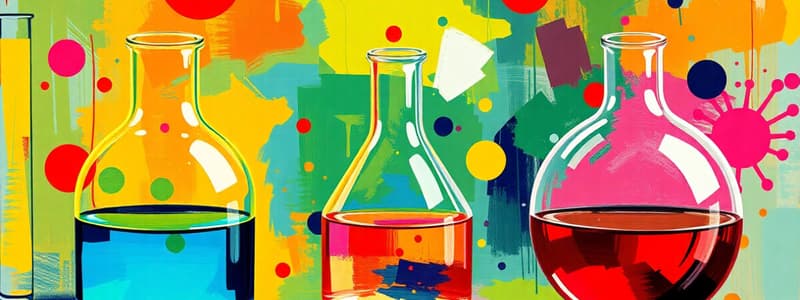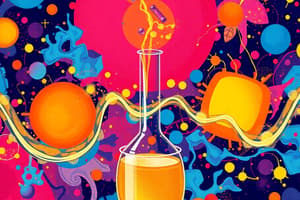Podcast
Questions and Answers
Which of the following best describes a solution?
Which of the following best describes a solution?
- A homogeneous mixture where all substances are visible with a microscope.
- A homogeneous mixture of two or more substances that cannot be mechanically separated. (correct)
- A mixture that only contains two substances.
- A heterogeneous mixture where substances can be mechanically separated.
In a solution, what is best described as the 'solute'?
In a solution, what is best described as the 'solute'?
- The substance that is dissolved. (correct)
- The substance that dissolves another substance.
- The substance that is readily available.
- The container the substance is in.
Which of the following properties does NOT describe an aqueous solution?
Which of the following properties does NOT describe an aqueous solution?
- Conductivity.
- pH.
- Ability to be filtered. (correct)
- Solubility.
A substance that is considered 'slightly soluble' is likely what type of compound?
A substance that is considered 'slightly soluble' is likely what type of compound?
What does it mean for a substance to be considered an 'electrolyte'?
What does it mean for a substance to be considered an 'electrolyte'?
Which of the following is an example of a non-electrolyte when dissolved in water?
Which of the following is an example of a non-electrolyte when dissolved in water?
What color will litmus paper turn when it comes into contact with an acid?
What color will litmus paper turn when it comes into contact with an acid?
What is the pH value of a neutral solution?
What is the pH value of a neutral solution?
According to the Arrhenius Theory, what occurs when a substance dissolves?
According to the Arrhenius Theory, what occurs when a substance dissolves?
When a very soluble ionic compound dissolves, what process occurs?
When a very soluble ionic compound dissolves, what process occurs?
What is the correct dissociation equation for copper (II) chloride?
What is the correct dissociation equation for copper (II) chloride?
Which of the following compounds is expected to remain as a solid and NOT dissociate in water?
Which of the following compounds is expected to remain as a solid and NOT dissociate in water?
Which of the following best describes what happens to soluble molecular compounds with hydrogen bonding when dissolved in water?
Which of the following best describes what happens to soluble molecular compounds with hydrogen bonding when dissolved in water?
What process converts neutral atoms into ions?
What process converts neutral atoms into ions?
Which of the following characteristics is NOT typical of insoluble molecular compounds?
Which of the following characteristics is NOT typical of insoluble molecular compounds?
How do strong acids behave in solution?
How do strong acids behave in solution?
Which of the following is a characteristic of slightly soluble ionic compounds?
Which of the following is a characteristic of slightly soluble ionic compounds?
What is the correct dissociation equation for ammonium carbonate?
What is the correct dissociation equation for ammonium carbonate?
What is the behaviour of a weak acid when dissolved in water?
What is the behaviour of a weak acid when dissolved in water?
What is NOT a major entity present in a solution?
What is NOT a major entity present in a solution?
How does the behavior of a substance during dissolution differ between an electrolyte and a non-electrolyte?
How does the behavior of a substance during dissolution differ between an electrolyte and a non-electrolyte?
What distinguishes the behavior of a polar molecular substance versus a non-polar molecular substance when introduced into water?
What distinguishes the behavior of a polar molecular substance versus a non-polar molecular substance when introduced into water?
For a substance that is termed 'slightly soluble,' which characteristic is typically expected?
For a substance that is termed 'slightly soluble,' which characteristic is typically expected?
How does an acid differ from a base in terms of its effect on litmus paper and ion concentration in a solution?
How does an acid differ from a base in terms of its effect on litmus paper and ion concentration in a solution?
If a substance does not change the color of litmus, what can be generally inferred about its pH and chemical nature?
If a substance does not change the color of litmus, what can be generally inferred about its pH and chemical nature?
According to the principles of 'like dissolves like,' which of the following scenarios is most probable?
According to the principles of 'like dissolves like,' which of the following scenarios is most probable?
During dissociation of ionic compounds in water as described by Arrhenius’ theory, what is the key process occurring at the submicroscopic level?
During dissociation of ionic compounds in water as described by Arrhenius’ theory, what is the key process occurring at the submicroscopic level?
Given the reaction $NaCl(s) \rightarrow Na^+(aq) + Cl^-(aq)$, what is the driving force for this process according to what you know of the nature of solutions?
Given the reaction $NaCl(s) \rightarrow Na^+(aq) + Cl^-(aq)$, what is the driving force for this process according to what you know of the nature of solutions?
How would one expect the conductivity of an aqueous solution containing a molecular substance to change as the amount of the substance dissolved increases?
How would one expect the conductivity of an aqueous solution containing a molecular substance to change as the amount of the substance dissolved increases?
Which of the following cannot be separated through mechanical means?
Which of the following cannot be separated through mechanical means?
Which of the following represents the correct dissociation of iron (III) nitrate in water?
Which of the following represents the correct dissociation of iron (III) nitrate in water?
A solution is prepared by dissolving $C_{12}H_{22}O_{11}$ in water. What are the major entities present in this solution?
A solution is prepared by dissolving $C_{12}H_{22}O_{11}$ in water. What are the major entities present in this solution?
Which of the following correctly depicts the behavior of a slightly soluble ionic compound in water?
Which of the following correctly depicts the behavior of a slightly soluble ionic compound in water?
Given that $Ba(OH)_2$ is a base, what is the expected dissociation behavior when it is dissolved in water?
Given that $Ba(OH)_2$ is a base, what is the expected dissociation behavior when it is dissolved in water?
Which characteristic is most indicative of a strong acid in an aqueous solution?
Which characteristic is most indicative of a strong acid in an aqueous solution?
What is the correct dissociation equation for calcium hydroxide ($Ca(OH)_2$)?
What is the correct dissociation equation for calcium hydroxide ($Ca(OH)_2$)?
What are the expected major entities present when $CH_4$ is present in a solution:
What are the expected major entities present when $CH_4$ is present in a solution:
Which of the following best describes what happens when $HF$ is placed in water?
Which of the following best describes what happens when $HF$ is placed in water?
Which of the following best describes the behavior of polar molecules with hydrogen bonding when dissolved in water?
Which of the following best describes the behavior of polar molecules with hydrogen bonding when dissolved in water?
How does the dissociation of $(NH_4)_2SO_4$ differ from the ionization of HCl?
How does the dissociation of $(NH_4)_2SO_4$ differ from the ionization of HCl?
Flashcards
Solution
Solution
A type of mixture where two or more substances are evenly distributed throughout, making it impossible to separate the components mechanically. Think of sugar and water.
Solute
Solute
The component in a solution that is dissolved, like sugar in water.
Solvent
Solvent
The component in a solution that dissolves the solute, like water dissolving sugar.
Solubility
Solubility
Signup and view all the flashcards
Electrolyte
Electrolyte
Signup and view all the flashcards
Non-electrolyte
Non-electrolyte
Signup and view all the flashcards
Acid
Acid
Signup and view all the flashcards
Base
Base
Signup and view all the flashcards
pH
pH
Signup and view all the flashcards
Dissociation
Dissociation
Signup and view all the flashcards
Dissociation of Ionic Compounds
Dissociation of Ionic Compounds
Signup and view all the flashcards
Slightly Soluble Ionic Compounds
Slightly Soluble Ionic Compounds
Signup and view all the flashcards
Ionization
Ionization
Signup and view all the flashcards
Strong Acids
Strong Acids
Signup and view all the flashcards
Weak Acids
Weak Acids
Signup and view all the flashcards
Soluble Molecular Compounds
Soluble Molecular Compounds
Signup and view all the flashcards
Insoluble Molecular Compounds
Insoluble Molecular Compounds
Signup and view all the flashcards




